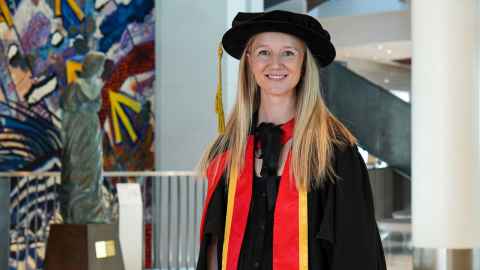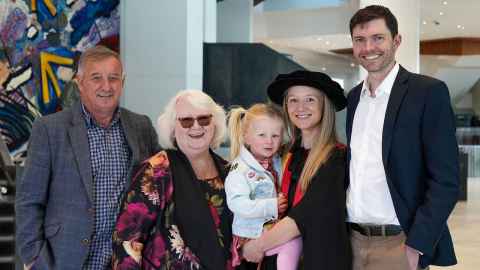Doctoral study reveals refugee students at NZ universities feel excluded
8 September 2025
Universities in New Zealand need to do much more to ensure students from refugee backgrounds feel they belong here, according to an education graduate's PhD thesis.

Despite well-meaning efforts, universities in Aotearoa New Zealand are still essentially ‘white spaces’.
This was the key finding of University of Auckland doctoral student Alex Pennycuick, who is graduating with a PhD in education in the University's Spring ceremonies.
Pennycuick did an in-depth study of the lives and experiences of students from Afghanistan, Iraq, Burma and Sudan at four universities: Auckland, AUT, Canterbury and Otago.
She interviewed them at length and multiple times over the course of her four-year PhD and found that while these students are highly motivated and committed to their education, they still often experience universities as ‘white spaces’ where they feel out of place.
“The students felt that the whiteness showed up in the curriculum, campus culture, and social environments that excluded them, but the intensity and form of exclusion varied depending on demographics; for example, Auckland and AUT have different student demographics to Canterbury and Otago.”
Pennycuick says that while overt racism was rare, many students experienced regular ‘microaggressions’ like constantly being asked, “Where are you from?”
“One Burmese student compared university life to ‘driving a car in the bus lane’, technically allowed, but deeply uncomfortable and unwelcome; a sentiment echoed by many others.”
What stood out most, she says, was that students didn’t want to talk about belonging, the original focus of her research, but about 'non-belonging'.
“Their stories showed just how fragile belonging is for them. It was something they found only in pockets – like at a refugee student club, a cultural association, or a campus mosque – but rarely in the learning environment.”

She says the students’ sense of identity was also multi-layered, and included not only race but religion (Islam, Buddhism, Christianity), gender, sexuality and class, and these often intensified their feelings of exclusion.
Muslim women in particular described feeling especially visible and judged because of their hijab, their gender, and their refugee status.
“Their very presence at university challenged social expectations of what a woman ‘like them’ was meant to be doing,” says Pennycuick.
She says students from refugee backgrounds (SRBs) are an important but often overlooked group within the broader focus on equity and diversity, and unlike other equity groups, get little dedicated funding or support.
“My thesis shows that current inclusion policies are inadequate, as they imply minority students must ‘fit in’ to pre-existing white-dominated spaces. If we do this, we’re ignoring the structural barriers and boundaries that make belonging so difficult in the first place.”
She says universities should instead aim to reshape themselves into spaces where diverse students genuinely feel ownership and belonging.
“I think this work is ever more urgent in today’s political climate, with populist, anti-diversity rhetoric rising, both in New Zealand and globally.
“Universities can’t be complacent. Māori, Pacific, and refugee-background students all face heightened feelings of being ‘othered’, and while we have made some progress in this area, acknowledging that some universities still remain white spaces is the first step to change. I think this is an ethical responsibility.”
A high school teacher, the mother of nearly three-year old Ruby, and expecting her second child, Pennycuick has worked as a teacher in India and Morocco (in low-socioeconomic communities) and in New Zealand as a volunteer at the Mangere Refugee Resettlement Centre.
“My time at Mangere in particular sparked my interest in educational equity and refugee experiences, but I still struggled at first with the idea of being a ‘Pākehā New Zealander from the North Shore’ talking about whiteness!
I think this work is ever more urgent in today’s political climate, with populist, anti-diversity rhetoric rising, both in New Zealand and globally.
“However, I believe in American author and educator bell hooks’ sentiment that ‘marginality is much more than a site of deprivation', but one of radical possibility and resistance.”
She graduates at the Auckland Town Hall on Monday 8 September as part of the Faculty of Arts and Education ceremony, with partner Nico, her parents, and little Ruby cheering her on.
“Balancing family life with doctoral research hasn’t always been easy, but I’ve had plenty of support, from my family, and from my supervisors Professor Jay Marlowe and Dr Ritesh Shah, who are incredible," she says.
Pennycuick says she wanted to write her thesis in a way that was accessible and useful – not just academic jargon.
“My hope is that this work sparks conversations about how universities think about belonging.”
Unsettling Inclusion: Navigating Whiteness and Belonging among Refugee Background Students in New Zealand Universities by Alexandra Pennycuick is available via ResearchSpace.
Media contact
Julianne Evans | Media adviser
M: 027 562 5868
E: julianne.evans@auckland.ac.nz